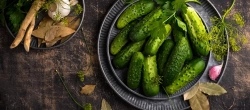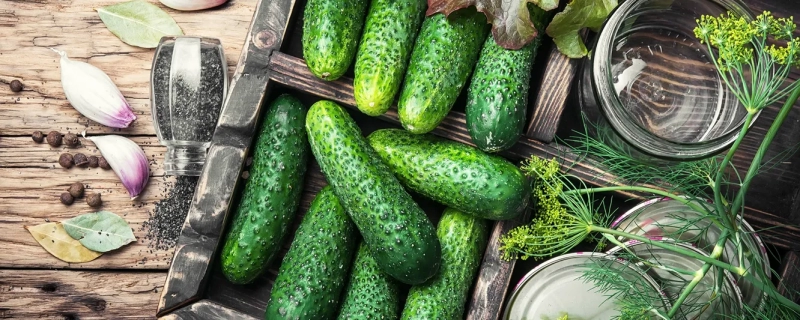Category: Vegetables
Cucumber: Taste, Uses, and Benefits
Cucumbers are a crunchy and refreshing vegetable that plays a significant role in many global cuisines. Their light, neutral flavor makes them perfect for salads, snacks, and beverages. This article explores the flavor characteristics of cucumbers, their health benefits, culinary uses, and tips for selection and storage.
What does Cucumber taste like?
Key Flavor Characteristics
Cucumbers have a neutral, slightly watery, and refreshing taste with faint hints of mild sweetness and herbaceousness. They are ideal for adding texture and freshness to dishes without overpowering other ingredients.
Aromatic and Textural Qualities
Cucumbers have a subtle, clean aroma, reminiscent of green herbs and with a faint melon-like scent. Their texture is crisp and juicy, especially when fresh, and their high water content makes them perfect for cooling dishes.
Scientific Description of Taste and Aroma
- Aroma: Clean, herbal, with a light freshness.
- Taste: Neutral, slightly sweet, with watery and green notes.
- Texture: Crisp and juicy, adding lightness and refreshing structure to dishes.

In-depth Flavor Analysis of Cucumbers
Underlying Flavor Notes
When tasting cucumbers closely, several key flavor aspects stand out:
- Green Notes: Cucumber flavor is often compared to freshly cut grass, adding a hint of earthiness and subtle sweetness.
- Watery Freshness: High water content gives cucumbers a juicy, light quality, making them perfect for hot weather dishes.
- Mild Sweetness: Cucumber’s subtle sweetness is highlighted when paired with acidic or salty flavors, adding depth to dishes.
Impact of Temperature on Flavor
- Fresh Cucumber: When consumed raw, cucumber retains its maximum crunchiness and refreshing qualities.
- Pickled Cucumber: Pickling brings out a tangy-sweet flavor while preserving its texture and adding complexity.
- Cooked Cucumber: Heat reduces cucumber’s freshness, but the earthy taste becomes more intense.
Textural Qualities
Fresh cucumber has a dense, juicy texture that adds a pleasant crunch to dishes. When pickled or cooked, it retains its shape but becomes softer and more pliable.
Culinary Uses of Cucumbers
Primary Uses
- Salads: Cucumbers are commonly added to salads for a fresh, crisp bite. They pair well with other vegetables and greens.
- Pickling: Cucumbers are a popular ingredient for pickling, as they absorb the flavor of spices while keeping their texture.
- Drinks and Smoothies: Cucumbers add freshness and a cooling effect to beverages, often used in detox waters and green smoothies.
- Snacks: Sliced cucumbers served with dips make for a light, healthy snack.
- Warm Dishes: Cucumbers can be added to warm dishes like soups and stews, providing a mild texture and balancing stronger flavors.
Ideal Pairings for Cucumbers
- Yogurt: Yogurt enhances cucumber’s freshness with a creamy texture, popular in dishes like tzatziki.
- Tomatoes and Onions: A classic pairing for salads, where cucumber adds crunch.
- Mint and Basil: Fresh herbs emphasize cucumber’s herbaceous notes and add extra freshness.
- Citrus: Lime and lemon enhance cucumber’s watery, clean flavor.
- Garlic and Dill: These spices complement cucumber in pickles and sauces, adding a savory contrast.
Health Benefits of Cucumbers
Key Nutrients and Benefits
- Hydration: Cucumbers contain about 95% water, which helps maintain hydration levels.
- Vitamins and Minerals: Vitamins K, C, and potassium support bone health, immune function, and heart health.
- Antioxidants: Cucumbers contain antioxidants like flavonoids and tannins, which help reduce inflammation and protect cells.
- Low-Calorie Content: Cucumbers are low in calories and high in water, making them ideal for light snacks and weight management.
Potential Precautions
- Pesticides: Cucumbers may contain pesticide residues, so it’s best to wash them thoroughly or choose organic options.
- Allergies: Some people may be allergic to cucumbers, especially if they have allergies to other squash or melons.

Tips for Selecting and Storing Cucumbers
How to Choose Quality Cucumbers
- Color and Firmness: Fresh cucumbers should be a rich green color without yellow spots and firm to the touch.
- Size: Medium-sized cucumbers are usually more flavorful and crisp, while larger ones may be more watery and less flavorful.
Storage Recommendations
- In the Refrigerator: Store cucumbers in the refrigerator for 5-7 days. Wrapping them in a paper towel can help retain freshness.
- Freezing: Sliced cucumbers can be frozen for later use in smoothies, but they may lose their texture upon thawing.
Fun Facts About Cucumbers
- Historical Use: Cucumbers have been known since Ancient Egypt and were used both as food and for skincare.
- Skincare Benefits: Cucumbers are commonly used in skincare products due to their hydrating and soothing properties.
- Varieties: There are many types of cucumbers, including gherkins, long salad cucumbers, and Asian cucumbers, each with unique flavor and texture.